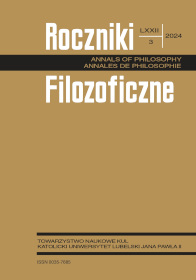On Freedom in Hobbes's Philosophy
On Freedom in Hobbes's Philosophy
Author(s): Krzysztof WawrzonkowskiSubject(s): Philosophy, History of Philosophy, Early Modern Philosophy
Published by: Towarzystwo Naukowe KUL & Katolicki Uniwersytet Lubelski Jana Pawła II
Keywords: Hobbes; freedom; right; law; state of nature; state of polity; artificial body; Levia-than; Elements of Law; De Cive; sovereign; subject
Summary/Abstract: This article aims to present Thomas Hobbes’s views on freedom. I discuss how the philoso-pher understands freedom and the realm of human actions within which, according to him, it can manifest. In this context, I reconstruct both the state of nature, in which humans lived in less socialized times, and the state of polity, within which they have functioned since creating that artificial body known as the state. Hobbes’s reference to the Latin terms jus and lege, meaning right and law and their consistent application in the philosopher’s subsequent writings facilitates a more precise definition of the scope of human freedom and explains the differences in this matter between the subject and the sovereign. Ultimately, it is this relationship, subject–sovereign, that proves central to a clear and complete understanding of the issue of freedom. Therefore, I devote relatively the most space in the article to its discussion.
Journal: Roczniki Filozoficzne
- Issue Year: 72/2024
- Issue No: 3
- Page Range: 149-161
- Page Count: 13
- Language: English

